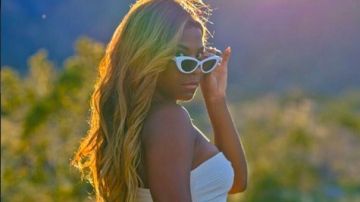How Cutting My Hair Healed Me From A History of Shame and Pain
Just as soon as I sat down, my stylist started snipping

Photo: Courtesy of Kamari Chelsea
Just as soon as I sat down, my stylist started snipping. A “rough cut” is what she called it, but somehow the kinks fell smoothly to the ground, amassing a large pile of colorful fur around me. This was the beginning. It’s no secret that hair has been a loaded topic for women of color since we first set foot on western soil. According to the Encyclopedia of Hair, in the 1700s when Africans were brought to North America as slaves, “whites referred to their hair as ‘wool,’ as though it belonged to animals rather than people.” And, if African slaves had wavy hair, jealous white mistresses would force them to cut their hair so they would appear “less attractive.”
And while the 1700s feels light-years away, the impact of that dehumanization and Eurocentric beauty standards still permeate into our collective subconscious. None of this was lost on me, as my emotions vacillated with each “snip,” between feeling free from things much heavier than the locks on my head and a familiar, learned panic about the impact my new close-cropped hair would have on my attractiveness.
So why did I do it? To be reminded of the most important things at the root of my life.
My first experience of a woman chopping off her luscious locks happened when I was 12-years-old. I stood in the doorframe of my parents’ bathroom as my dad slowly and methodically shaved my mother’s head. Her already frail frame, reduced by ongoing chemotherapy, was diminishing in volume with every stroke of the clippers against her scalp, and I vividly pictured her full head of bouncy, thick dark hair—hair that was already a distant memory falling to the floor in deafening thumps. I swore to myself then that when I grew up, I would never have short hair.
Throughout high school, I struggled with typical teenage angst, which was easily fed by reminders of my non-whiteness. The tell-tale sign that I would never quite fit in was my hair. Other black girls in my class had soft waves and perfect blowouts. My white best friends jumped gleefully into pools at backyard barbecues, while I sat on the edge a safe distance away from any droplets of rogue water (I always blamed my period and said I couldn’t go in). A motherless girl, I relied on my aunt and grandma to take me to regular appointments in the ‘hood to have a full weave installed. The stuff that grew out of my scalp was humiliating, difficult, and everything an attractive woman was not: short, thick, complicated, unpredictable, and black.

In college, I felt special when Dominican boys would compliment me on my good hair, pointing out how it was so much better than the other girls’ hair. I felt a secret thrill that they were blissfully unaware that it was simply a good weave. I cringed at the thought of them finding me out, ducking in a panic anytime someone playfully reached to stroke my hair.
In fact, there was only one brown boy who ever really suggested that I “lose the weave.” He had natural deep waves in his hair and swore he was “just black.” He found me out (as in, discovered my hair was a total fraud) when we started dating in high school, and by the time we were in deep—deep in college and deep in love—he was into me and over the fake stuff. I remember sitting in the passenger seat of his car, rolling my eyes and chanting my “yeah, yeah, yeahs,” as he handed me a wad of cash and offered to pay for me to get my real hair done. I couldn’t understand why someone would so badly want to run their fingers through the wool that so many messages in our society openly rejected. Natural hair was not a thing… and short hair was definitely not a thing. That would be the last time I ever saw him.


The day after his funeral, I willed myself onto the city bus that would take me downtown to J.C. Penny. It was there that I cut out my weave and looked at myself in the mirror for the first time in years. I was a woman I never thought I would be.

I cried that first time I cut my hair for a million reasons. I was seeing myself and the world differently, realizing for the first time ever that everything I’d ever been told about what’s on my head and in my head was a lie. I wasn’t an animal. I wasn’t less at tractive. I wasn’t a collection of tragic memories. I was a woman who looked just like my momma, and probably her momma and her momma too—who at some point had likely been reduced to an animal or forced to feel less attractive. I realized then that maybe my high school love was right—I was beautiful. And I owed it to him, and to my mom, to accept that my hair—no matter its condition—will never rob me of my beauty.
https://www.instagram.com/p/BhUy2p8jInd/?taken-by=kamarichelsea
https://www.instagram.com/p/BkGgnpaHqGq/?taken-by=kamarichelsea


There have been many seasons in my life since then when I decided to take the healing “chop.” While the aesthetics and ability to play with texture and color are fun, each cut reminds me of multiple lifetimes of strength and growth and acceptance. Haircuts feel like radical self-love and self-care. Each time, as my kinks spring out wildly around me, I imagine my ancestors and angels rejoicing that I have reclaimed my identity.
[article_ad]

















